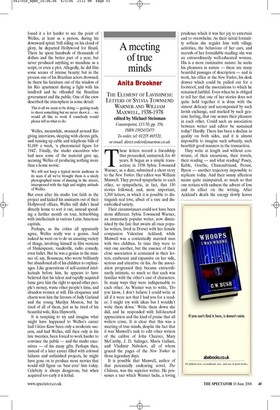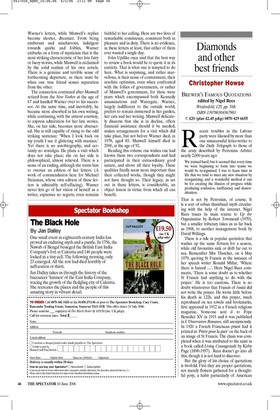A meeting of true minds
Anita Brookner
THE ELEMENT OF LAVISHNESS: LETTERS OF SYLVIA TOWNSEND WARNER AND WILLIAM MAXWELL, 1938-1978 edited by Michael Steinman Counterpoint, £13.50, pp. 356, ISBN 1582432473 To order, tel: 01235 465521, or email: direct.orders@marston.co.uk These letters record a friendship that proceeded, unmarred, for 40 years. It began as a simple transaction; in 1938 Sylvia Townsend Warner, as a dare, submitted a short story to the New Yorker. Her editor was William Maxwell. They proved sympathetic to each other, so sympathetic, in fact, that 150 stories followed, and, more important, 1,300 letters, in which it is possible to distinguish real love, albeit of a rare and disembodied variety.
Their circumstances could not have been more different. Sylvia Townsend Warner, an immensely popular writer, now diminished by the fate that awaits all once popular writers, lived in Dorset with her female companion Valentine Ackland, while Maxwell was a contentedly married man with two children. In time they were to visit one another, but the essence of their close association is contained in their letters, exuberant and expansive on her side, serious and attentive on his. As the association progressed they became extraordinarily intimate, so much so that each was familiar with the other’s cast of characters. In many ways they were indispensable to each other. As Warner was to write, ‘Do you know, I don’t believe I could write at all if it were not that I had you for a reader. I might toy with ideas but I wouldn’t write them down.’ Write them down she did, and he responded with full-hearted appreciation and the kind of praise that all writers crave. It is clear that this was a meeting of true minds, despite the fact that it was Maxwell’s task to edit other writers of the calibre of John Cheever, Mary McCarthy, J. D. Salinger, Mavis Gallant, and Vladimir Nabokov, all of whom graced the pages of the New Yorker in those legendary days.
It is possible that Maxwell, author of that perennially endearing novel, The Château, was the superior writer. He possesses a tact which Warner lacks, a loving prudence which it was her joy to entertain and to overwhelm. As their initial formality softens she regales him with village activities, the behaviour of her cars, and records of her formidable reading: she was an extraordinarily well-educated woman. His is a more ruminative nature: he seeks his pleasures in nature — there are many beautiful passages of description — and in work, his office at the New Yorker, his desk drawer which could be pulled out for a footstool, and the associations to which he remained faithful. Even when he is obliged to tell her that one of her stories does not quite hold together it is done with the utmost delicacy and accompanied by such lavish exchange, and marked by such genuine feeling, that one senses their pleasure in each other. Could such an association between writer and editor be sustained today? Hardly. There has been a decline in quality on both sides, and it is almost impossible to imagine such urbanity, such heartfelt good manners in the transaction.
They write at length and without constraint, of their excursions, their travels, their reading — and what reading! Pusey, Keble, Goethe, Chateaubriand, Proust, Byron — another trajectory impossible to replicate today. And their sunny affection seems quite unimpaired, so much so that one notices with sadness the advent of loss and its effect on the writing. After Ackland’s death the energy slowly leaves Warner’s letters, while Maxwell’s replies become shorter, dreamier. From being exuberant and mischievous, indulgent towards quirks and foibles, Warner embarks on a form of mysticism that is the most striking characteristic of her late fairy or faery stories, while Maxwell is reclaimed by the solid realism of his own novels. There is a genuine and terrible sense of forthcoming departure, as there must be when one true friend senses separation from the other.
The connection continued after Maxwell retired from the New Yorker at the age of 67 and handed Warner over to his successor. At the same time, and inevitably, he became more absorbed in his own writing, while continuing, with the utmost courtesy, to express admiration for her late stories. She, on her side, becomes more abstracted. She is still capable of rising to the odd striking sentence: ‘When I look back on my youth I see it glittering with maniacs.’ Yet there is no autobiography, and certainly no nostalgia. He plans a visit which does not take place; she on her side is philosophical, almost relieved. There is a sense of an ending, although she trusts him to oversee an edition of her letters. (A work of commendation here for Michael Steinman, whose own edition of these letters is admirably self-effacing). Warner never lets go of her vision of herself as a writer, expresses no regrets, even remains faithful to her calling. Here are two lives of remarkable consistency, consistent both in pleasure and in duty. There is no evidence, in these letters at least, that either of them ever wasted a single day.
John Updike once said that the best way to review a book would be to quote it in its entirety. That is what one is tempted to do here. What is surprising, and rather marvellous, is their sense of contentment, their resolute optimism, even when confronted with the follies of governments, or rather of Maxwell’s government, for these were years which encompassed both Kennedy assassinations and Watergate. Warner, largely indifferent to the outside world, prefers to remain immersed in her garden, her cats and her writing. Maxwell delicately discerns that she is in decline, offers financial assistance should it be needed, makes arrangements for a visit which did take place, but not before Warner died, in 1978, aged 85. Maxwell himself died in 2000, at the age of 92.
Reading this volume one wishes one had known these two correspondents and had participated in their extraordinary good nature, and above all their loyalty. These qualities finally seem more important than their collected works, though they might not have thought so. Their legacy, as set out in these letters, is considerable, an object lesson in virtue from which all can benefit.



















































































 Previous page
Previous page